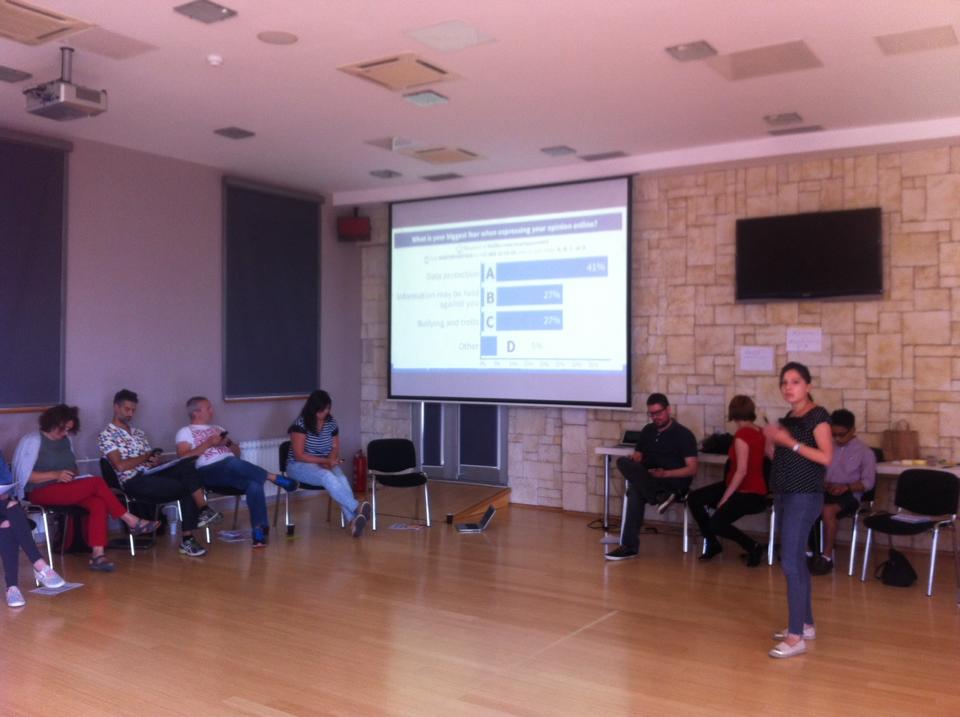A training of trainers and a youth training on digital democracy were delivered in Zadar.
In cooperation with European Citizen Action Service (ECAS) from Belgium and European partners from Belgium, Bulgaria, Hungary, United Kingdom and Iceland, GONG organized a two-day training – youth bootcamp, held in IMPACT center in Zadar, and a training of trainers, financially supported by the US Alumni Funda and the European Commission through the Erasmus+ Programme.
The training gathered about 40 young people (between 17 and 35 years of age) and an international group of trainers. It was devoted to digital democracy, and focused particularly on listening to the voice of youth on mobility and the future of the Erasmus+ programme. The training was held as part of the Digital Ecosystem for e-Participation Linking Youth (DEEP-Linking Youth) project, implemented by ECAS (EUROPEAN CITIZEN ACTION SERVICE, and partners are Erasmus Student Network (ESN) and The Consultation Institute (TCI) from United Kingdom, Civil College Foundation from Hungary, ProInfo Foundation from Bulgaria, GONG from Croatia and Citizens Foundation from Iceland. Apart from the presentatios and theoretical backgrounds, the training methods were largely participatory and included practical exercises, discussions based on participants’ experiences and video production, to support expressions of opinions and suggestions providede by youth. Ten video materials were prepared during the training.
The goal of the training was to support young participants in expressing their proposals in the area of youth mobility, and prepare them for creating digital content to express their suggestions and influence the decision-making process. The expected outcomes included feedback and proposals from youth, and video content on mobility.
To achieve these outcomes, the training focused on the following key areas and topics:
– Forms of civic and political participation of youth
– Digital democracy and youth
– Youth mobility through Erasmus+ programme, volunteering and other similar programmes which enable learning or working mobility.
Krešimir Krolo from the University in Zadar delivered a presentation entitled Participatory Culture and Youth Participation in Digital Media Environment – from theory to data.
Elisa Lironi from ECAS delivered the presentation entitled Potental and Challenges of Digital Democracy in EU. After her presentation, the participants joined the online poll on digital participation. More information about e-participation of youth in the decision-making process, as well as additional information about project activities can be found at the website of the DEEP-Linking Youth project http://deeplinkingyouth.eu/ . As part of the project, a digital competition will be launched. More information is available at http://deeplinkingyouth.eu/activities/digital-competition/.
This session on Learning Mobility of Youth consisted of two presentations and an interactive exercise used to provide an opportunity to exchange opinions and suggestions on the Erasmus+ programme and the issue of learning mobility.
The youth discussed various advantages of participating in mobility programmes, including the following:
opportunities for learning new things and developing new competencies, learning how to cope with new situations, intercultural learning, developing soft skills, which include cooperation and communication skills which are important for future career success.
However, the participants also discussed the challenges, which included difficulties with getting their credits/degrees recognised after returning to their university, financial difficulties, problems with finding appropriate accommodation (particularly in EU countries with higher standard of living) and problems related to increasing the level of information about the positive sides of Erasmus+ programmes among employers.
Gaffar Rampage presented the experiences of the Erasmus+ students from the perspective of the Erasmus Studenats Network (ESN), and Rafaela Burmeta spoke about the experiences of the University of Zadar with organising and involving youth in the Erasmus+ programme. The International Relations Office of the University of Zadar organised a competition – „Best Erasmus+ video“ – which invited students to share their experences with Erasmus+.
The introductionory presentation to the video production was delivered by Guy Degen, and attitional support and tips throughout the video production were provided by Ivan Radović.
The workshop introduced the participants to different types and processes of production of online video content. Special emphasis was placed on availability and simplicity of video production and training on using useful mobile applications for editing video materials, available audio/video equipment and user-friendly production techniques. After the theoretical introduction had been provided, the participants were divided into small groups, and proceeded to prepare and produce 10 video materials on mobility and Erasmus+ programme, supported by the trainers as necessary. The videos presented both the advantages and challenges of participating in mobility programmes, as well as presented proposals.
